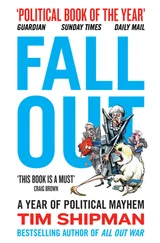Tim Shipman - All Out War - The Full Story of How Brexit Sank Britain’s Political Class
Здесь есть возможность читать онлайн «Tim Shipman - All Out War - The Full Story of How Brexit Sank Britain’s Political Class» — ознакомительный отрывок электронной книги совершенно бесплатно, а после прочтения отрывка купить полную версию. В некоторых случаях можно слушать аудио, скачать через торрент в формате fb2 и присутствует краткое содержание. Жанр: unrecognised, на английском языке. Описание произведения, (предисловие) а так же отзывы посетителей доступны на портале библиотеки ЛибКат.
- Название:All Out War: The Full Story of How Brexit Sank Britain’s Political Class
- Автор:
- Жанр:
- Год:неизвестен
- ISBN:нет данных
- Рейтинг книги:3 / 5. Голосов: 1
-
Избранное:Добавить в избранное
- Отзывы:
-
Ваша оценка:
- 60
- 1
- 2
- 3
- 4
- 5
All Out War: The Full Story of How Brexit Sank Britain’s Political Class: краткое содержание, описание и аннотация
Предлагаем к чтению аннотацию, описание, краткое содержание или предисловие (зависит от того, что написал сам автор книги «All Out War: The Full Story of How Brexit Sank Britain’s Political Class»). Если вы не нашли необходимую информацию о книге — напишите в комментариях, мы постараемся отыскать её.
All Out War: The Full Story of How Brexit Sank Britain’s Political Class — читать онлайн ознакомительный отрывок
Ниже представлен текст книги, разбитый по страницам. Система сохранения места последней прочитанной страницы, позволяет с удобством читать онлайн бесплатно книгу «All Out War: The Full Story of How Brexit Sank Britain’s Political Class», без необходимости каждый раз заново искать на чём Вы остановились. Поставьте закладку, и сможете в любой момент перейти на страницу, на которой закончили чтение.
Интервал:
Закладка:
The key question from this period is: could the referendum have been avoided, and if it could not, did Cameron have to offer an in/out vote by the end of 2017? When the cabinet was informed of the decision it horrified the veteran Europhile Ken Clarke: ‘I was not consulted. I read about it in the newspaper. We had a row about it, but it was a done deal. I think it was the most reckless and irresponsible decision.’15 Yet even a dyed-in-the-wool Europhile like Alistair Burt gave Cameron the benefit of the doubt: ‘I don’t blame the prime minister for calling the referendum, because you can’t keep the people hostage, and it was important, not just for party management but important for the country, that the people had this vote.’ There were practical concerns too. David Lidington, Cameron’s Europe minister, said, ‘Had he not promised the referendum, I think it would have been hugely difficult to win the 2015 general election at all.’
Cameron’s aides believed failure to announce a referendum would have led to a leadership challenge when Ukip won the European elections in 2014. ‘The idea that the PM was going to survive and face down his party is for the birds. We would have had a new leader coming in saying “I’m going to call a referendum,” and probably saying they were going to back Brexit,’ one said. The pollster Andrew Cooper agreed: ‘If he’d taken the party on, I think he would have lost. Ukip was on the rise, the party was in revolt.’
Yet one of Cameron’s closest aides believed that he may have stepped back from the brink if the Bloomberg speech had come after the Scottish referendum in September 2014, which uncorked the uncontrollable passions about which George Osborne had warned: ‘After the Scottish referendum experience we realised you’re unleashing things you can’t control. That’s the one thing I’d say would have changed our mind.’ By the time Tory high command collectively came to recognise the risks, it was too late.
If Cameron had to offer a referendum, he did not have to offer an in/out referendum. A group of Eurosceptics – Bill Cash, Bernard Jenkin and John Redwood – went to see the prime minister before the Bloomberg speech to suggest he lance the boil by holding a ‘mandate referendum’ with the question ‘Do you agree that the United Kingdom should establish a new relationship with our European partners based on trade and cooperation?’ Cameron was at first interested in the idea, but later asked, ‘Who’s going to oppose that?’ Jenkin replied, ‘Exactly!’ But Cameron saw the plan as potentially dangerous. He did not believe Britain’s links to the EU should be confined to trade. Jenkin said, ‘That referendum question, if approved, would have been completely incompatible with our present terms of membership. So he shied away from that and went for the in/out referendum.’
There were other options. Cameron could have devised his own mandate referendum, giving him licence to secure a deal when a treaty was next agreed. He could have defied the Liberal Democrats and begun a process of renegotiation with Merkel over a number of years, blaming his coalition partners for the lack of an immediate vote. He certainly did not have to say that there would be a referendum before the end of 2017. He could even have attempted to face down his party and confront their arguments. But in truth he had set himself on the path of tactical retreat from the moment he agreed to pull the Tories out of the EPP during his leadership campaign.
In calling for ‘fundamental, far-reaching change’ of Britain’s relationship with the EU, the Bloomberg speech raised expectations that would be very difficult to meet. To get what he wanted from the other member states and keep Britain in Europe, Cameron had to persuade them that he was prepared to leave, a posture that was regarded as incredible by the sceptics at home, who demanded that he threaten to lead the UK out, while telling the world that he was only bluffing. As Tony Blair was to remark, ‘David Cameron’s strategy is a bit like the guy in Blazing Saddles who says, “Put your hands up or I’ll blow my brains out!”’16
Rising immigration, fuelling the rise of Ukip, had led to Cameron’s referendum pledge. By mid-2014 it was clear that measures to curb immigration would also have to be the centrepiece of his new deal with Brussels. According to the official statistics, net migration to the UK was 177,000 in 2012, rose to 209,000 in 2013, before soaring to 318,000 in 2014. Those figures would have been politically damaging in their own right, but juxtaposed with Cameron’s long-standing pledge to limit net migration to the ‘tens of thousands’ they were explosive. As the figures rose, so too did support for Ukip. ‘The thing which turbocharged Europe was the massive jump in EU migration,’ a Cameron confidant said. ‘That’s what turned it from a niche Tory issue into a massive popular issue. The biggest problem with renegotiation was that it was absolutely clear we needed to control migration.’
The prime minister recognised the dangers, and used his speech to the Conservative Party conference in October 2014 to deliver a bold pledge: ‘Britain, I know you want this sorted so I will go to Brussels, I will not take no for an answer and – when it comes to free movement – I will get what Britain needs.’ The pledge was more than ambitious; as expectation-management went it was reckless, as Cameron would discover. Will Straw, who was to end up running the Remain campaign, said, ‘He promised his grassroots more than he was ever able to achieve.’
The first effort to tackle the issue came a month later, in November 2014, when Cameron made a speech at JCB, the construction-vehicle manufacturer owned by his friend Anthony Bamford. The preparations for that speech led to another psychodrama with Merkel, serious clashes between Cameron’s political aides and the civil service, a showdown with two of his most senior ministers, and did more to shape the final renegotiation deal even than the Bloomberg speech.
At heart, Cameron had two options: limit the number of EU migrants coming to Britain, or reduce the pull factors by cutting the benefits to which they were entitled. Iain Duncan Smith, the work and pensions secretary, and Michael Gove, by now the chief whip, pushed for quotas on the number of EU arrivals. The problem was that this flew in the face of the fundamental EU principle of the free movement of people. On 19 October the Sunday Times revealed that Cameron was considering ‘an annual cap on the number of National Insurance numbers given to low-skilled immigrants from Europe’. Cameron blamed Gove for the leak. But at an EU summit later the same week, Merkel told the paper’s Brussels correspondent Bojan Pancevski, ‘Germany will not tamper with the fundamental principles of free movement in the EU,’ words that killed the idea stone dead when they were splashed on the front page.17 In a confrontation with Cameron in the British delegation’s room, Cameron explained that he needed a quota system or an emergency brake on numbers: ‘If I could deliver clear demonstration of grip with controls even if those were for a temporary period, I think I can crack this. But otherwise this is becoming an unsustainable position.’ But Merkel told the prime minister, ‘No, I’d never agree with that. No. No. No. No way. Never, David.’ A source present said, ‘She was being as unequivocal as I’d ever seen her, completely clear. And that’s what took us to the benefits route.’ Merkel had grown up under communism in East Germany. She was not prepared to compromise on the freedom to cross borders, which she had been denied for the first thirty-five years of her life.
The leak torpedoed a secret plan Oliver Letwin and a small number of Cameron’s political advisers had been working on since July without the knowledge of civil servants. A Cameron adviser said the civil servants ‘went nuts when they found out – but they never understood the view that we would struggle to win a referendum without a very serious immigration answer’. Cameron’s policy staff then devised a time-limited ‘emergency brake’ which Britain could pull in extreme circumstances to halt EU arrivals. But the plan sparked some of the most heated rows between the politicos and the career diplomats and civil servants led by Ivan Rogers, Britain’s ambassador to the EU, Cameron’s civil service EU adviser Tom Scholar, and William Hague’s special adviser Denzil Davidson. ‘There was opposition from the civil service,’ said a Downing Street aide. ‘The FCO’s approach was that this was completely unobtainable: “You’ll get outright rejection.”’
Читать дальшеИнтервал:
Закладка:
Похожие книги на «All Out War: The Full Story of How Brexit Sank Britain’s Political Class»
Представляем Вашему вниманию похожие книги на «All Out War: The Full Story of How Brexit Sank Britain’s Political Class» списком для выбора. Мы отобрали схожую по названию и смыслу литературу в надежде предоставить читателям больше вариантов отыскать новые, интересные, ещё непрочитанные произведения.
Обсуждение, отзывы о книге «All Out War: The Full Story of How Brexit Sank Britain’s Political Class» и просто собственные мнения читателей. Оставьте ваши комментарии, напишите, что Вы думаете о произведении, его смысле или главных героях. Укажите что конкретно понравилось, а что нет, и почему Вы так считаете.












